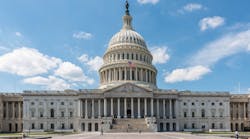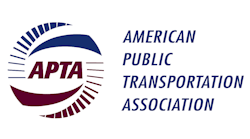APTA: Service cuts, capital projects and jobs are on the line without $32 billion in emergency relief funding for transit industry
Drastic reductions in service, increased fares, delayed or deferred procurements and capital projects, staff furloughs and layoffs and the shuttering of transit agency suppliers are all consequences that could come to pass should the transit industry not secure at least $32 billion in additional emergency financial relief from Congress.
These outcomes and others are reportedly being considered by transit agencies and industry businesses surveyed by the American Public Transportation Association (APTA). APTA says its survey, which was conducted earlier this month, shows six in 10 public transit systems will need to reduce service and furlough employees in the coming months, nearly one-half of public transit industry businesses (47 percent) expect to lay off employees and nearly one-third of transit industry businesses (31 percent) are concerned that they may go out of business.
The plight of transit agencies during the pandemic has been well-documented: Lockdown orders and continued remote working has hit ridership and revenues hard, yet those essential workers (including transit employees) who rely on transit to get to their jobs require and deserve an increased level of sanitization and other protective efforts to ensure their safety. These increased efforts come with added costs, which further add to the deficits agencies across the U.S. are facing.
“Congress and the administration are disregarding the essential lifeline that public transit plays in our communities. Our request for $32 billion is necessary to avoid catastrophic decisions that will only hurt our riders, our communities and the nation,” said APTA President and CEO Paul P. Skoutelas. “The industry continues to serve essential employees every day, but without additional emergency funding, many transit agencies will soon need to cut transit services and routes and furlough transit workers, leaving our communities without service and jobs when they need them most.”
While Skoutelas called the $25 billion the industry received in the Coronavirus Aid, Relief and Economic Security (CARES) Act a lifeline, he noted 92 percent of this funding has been obligated through the Federal Transit Administration. New York Metropolitan Transportation Authority (MTA) exhausted its CARES Act funds in July. Steve Poftak, general manager of Massachusetts Bay Transportation Authority (MBTA), told attendees on a press call Sept. 15 the CARES Act funds will help MBTA through 2021, but no further.
Impacts on agencies
Transit agencies are reporting slow ridership increases, but as APTA’s survey reports, 43 percent of agency respondents said their current weekday service levels are 75-100 percent what their pre-COVID-19 weekday service was. Additionally, fares have been re-instituted at four in 10 agencies and six in 10 large agencies.
APTA’s agency survey respondents said 61 percent are considering service cuts, while eight in 10 large agencies are considering service cuts to bridge funding gaps. In addition to service cuts, the survey reports:
- 45 percent are considering delaying, deferring or cancelling capital projects;
- 33 percent are considering delaying, deferring or cancelling vehicle purchases;
- 38 percent are considering eliminating routes;
- 31 percent are considering laying off staff, while 23 percent are considering furloughing staff;
- 20 percent are considering a reduction in the days of service; and
- 17 percent are considering fare increases.
“Public transportation is a lifeline for many during this challenging time. The pandemic put a spotlight on the importance of transit in keeping our society working, moving, responding and connecting. It is also vital to our nation’s post-pandemic recovery and the rebuilding of a more resilient, fairer, more productive and equitable future,” said Nuria I. Fernandez, APTA chair and general manager and CEO of Santa Clara Valley Transportation Authority. “Without further emergency funding, we will not have a path forward that prevents layoffs and devastating service cuts that would cause many underserved communities to suffer disproportionate economic and social impacts.”
Ripple effects on industry businesses
APTA says the transit industry supports “several million private-sector jobs,” but the dire circumstances agencies find themselves in because of the pandemic spreads to the private sector, as well.
Chris Stoddart, president of New Flyer, told attendees on a press call that his company spent $1.2 billion with U.S.-based suppliers last year, but the pandemic has resulted in 8,000 temporary layoffs and 400 permanent layoffs.
APTA’s survey of its business members also conducted earlier this month found 86 percent of businesses - more than eight in 10 - have seen a reduction in their transit industry business due to the impacts of the pandemic and more than one-third of these businesses have already furloughed employees.
The pandemic has also caused these businesses to cut back hiring, defer investments in their organizations and close facilities. Should additional emergency funding not be provided to these companies’ customers – the transit agencies – 54 percent will cut back hiring, 47 percent expect to lay off employees and 31 percent expect to furlough employees.
A destressing piece of information to come from APTA’s survey was when business members were asked if they were worried if their business existence was threatened due to the pandemic; 31 percent, approximately 51 respondents, answered yes.
“Congress and the administration must get serious and work in a bipartisan fashion to craft a COVID relief package that addresses the severe impact the pandemic has had on the transportation sector – especially with regard to transit. This is not about Republicans versus Democrats. This is about jobs for our friends and neighbors,” said Co-Chair Building America’s Future and former U.S. Secretary of Transportation Ray LaHood.
Pressure is on Congress
The Hill reports Speaker of the House Nancy Pelosi told colleagues on a call this week that the House will remain in session until a deal on a new stimulus package is struck. House Members are currently scheduled to end the current session Oct. 2.
Last week, an attempt to pass what was called a skinny stimulus failed. That option did not include any financial relief for the transit industry. A group of congressional representatives comprised of New York City U.S. House Reps. Hakeem Jeffries, Adriano Espaillat, Gregory Meeks, Jerry Nadler and Nadia Velazquez, as well as U.S. Sen. Charles Schumer, have said they would not support any proposal without aid to mass transit.
A New York City-based transit rider advocacy group – Riders Alliance – has released an analysis of transit bus and rail manufacturers in Plattsburgh, N.Y., which is part of U.S. Rep. Elise Stefanik’s district. The report notes the more than $1 billion in contracts MTA has awarded to Plattsburgh facilities for Nova Bus and Bombardier from 2011-2018. The facilities employ more than 1,000 workers, but Riders Alliance says without additional emergency federal funds for the MTA, those jobs could be at risk.
“Among upstate cities, Plattsburgh is the epicenter of MTA capital spending, turning out the buses and subway cars that transport millions downstate. If New York City's transit operations are kneecapped by federal austerity, Plattsburgh and the surrounding communities will suffer a very serious blow too,” said Danny Pearlstein, Riders Alliance policy and communications director. “Congresswoman Elise Stefanik built a lot of political capital with President Trump and must use it to save New York's economy and jobs in her district."

Mischa Wanek-Libman | Group Editorial Director
Mischa Wanek-Libman is director of communications with Transdev North America. She has more than 20 years of experience working in the transportation industry covering construction projects, engineering challenges, transit and rail operations and best practices.
Wanek-Libman has held top editorial positions at freight rail and public transportation business-to-business publications including as editor-in-chief and editorial director of Mass Transit from 2018-2024. She has been recognized for editorial excellence through her individual work, as well as for collaborative content.
She is an active member of the American Public Transportation Association's Marketing and Communications Committee and served 14 years as a Board Observer on the National Railroad Construction and Maintenance Association (NRC) Board of Directors.
She is a graduate of Drake University in Des Moines, Iowa, where she earned a Bachelor of Arts degree in Journalism and Mass Communication.






